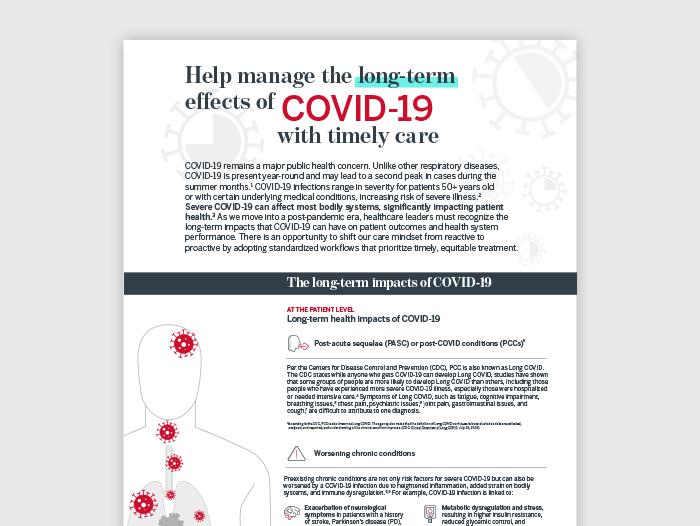Auto logout in seconds.
Continue LogoutCDC is considering loosening its isolation recommendations for people who test positive for COVID-19, according to sources who spoke to the Washington Post, sparking controversy among experts.
CDC considers loosening isolation guidance
Currently, CDC guidance states that those who test positive for COVID-19 should isolate for five days. That guidance has remained in place since late 2021 when the agency adjusted its recommended isolation period from 10 days down to five.
Under the proposed guidelines, Americans who test positive for COVID-19 would be able to return to work or school if they have been fever-free for at least 24 hours without medication, the same standard currently applied to influenza and respiratory syncytial viruses. Some states, including California and Oregon, have already implemented similar guidelines.
CDC has not confirmed the report and in a statement to NPR said the agency has "no updates to COVID guidance to announce at this time. We will continue to make decisions based on the best evidence and science to keep communities healthy and safe."
NPR reports the changes could come as early as April. However, an agency official who spoke to the Post said the timing could "move around a bit" until guidance is finalized.
Similarly, an HHS official who spoke to NBC News said no definitive decisions have been made. "It's way too preliminary," they said. There's "lots more consultation to be had."
What experts are saying
Some health experts said CDC's potential change makes sense and reflects the reality of what many people are currently doing.
William Schaffner, an infectious disease expert at Vanderbilt University Medical Center, said he and his colleagues have privately encouraged CDC to drop its five-day isolation period, partly because there's little evidence it's helping stem the spread of COVID-19.
The "rigorous recommendations that are currently in place do not reflect common practice," he said. "It's difficult to demonstrate that strict isolation has had a notable impact on transmission."
David Margolius, public health director for the city of Cleveland, said he was also in favor of easing isolation restrictions.
"For a couple years, people really associated public health with the elimination of Covid," he said. But "public health is about increasing life expectancy for our residents. It's about improving quality of life. And that is more than just controlling one virus."
While COVID-19 is still contagious, Abraar Karan, an infectious disease physician at Stanford Medicine, said what CDC and health departments "are trying to say is that we need to have policies that people are going to actually follow."
"Public health has to be realistic," said Michael Osterholm, an infectious disease expert at the University of Minnesota. "In making recommendations to the public today, we have to try to get the most out of what people are willing to do. … You can be absolutely right in the science and yet accomplish nothing because no one will listen to you."
However, other experts pushed against the proposed change, saying it will increase the spread of COVID-19.
Eric Topol, founder and director of the Scripps Research Translational Institute, said the proposed policy change is "reckless" and "will only serve to promote more spread of Covid and Long Covid."
"From a long-term health perspective, I think this sets really an unfortunate precedent," said Syra Madad, senior director of the special pathogens program at NYC Health and Hospitals.
Madad urged CDC to "seize this opportunity to truly change how we respond to deadly epidemics and pandemics and advocate for national, guaranteed paid sick and family leave instead of caving into the easier option of eliminating the isolation period."
Some experts worried Americans would interpret the change as suggesting COVID-19 is no longer a threat, despite the fact that it claimed around 1,500 lives a week at its peak this winter.
"There's still a lot of people getting Covid and dying from Covid in the U.S.," said Boghuma Titanji, an infectious diseases physician at Emory University.
"When you make a public health recommendation, it's not supposed to be based on what people are already doing," she said, adding that the advice has to be grounded in science.
Even if people ignore current guidance, the federal government's public health advice should be guiding people, not the other way around, said Jessica Malaty Rivera, an epidemiologist and communications advisor to the de Beaumont Foundation.
"It's like saying, well, people aren't really wearing a seat belt, so I guess we can say seat belts don't matter," she said. "That kind of defeats the purpose of providing evidence-based information — that's still the responsibility of public health to do that."
Jennifer Nuzzo, director of the Pandemic Center at Brown University School of Public Health, said the proposed change doesn't seem to take older Americans into account, or those who are immunocompromised or otherwise at risk.
At a minimum, Nuzzo said CDC should advise that people who end isolation after one fever-free day should also wear N95 masks or the equivalent when they leave their homes.
"Let's not pretend you're suddenly not contagious" after one day, she said. "We have to be very clear and transparent about that — to say that we think that there still is a risk." (Mandavilli, New York Times, 2/14; Huang, "Shots," NPR, 2/14; Sun, Washington Post, 2/13; Gumbrecht/Goodman, CNN, 2/13; Edwards/Lovelace Jr., NBC News, 2/13)
Use our resource library to learn how health plans can manage the impact of COVID-19 and what to prepare for next.
Don't miss out on the latest Advisory Board insights
Create your free account to access 1 resource, including the latest research and webinars.
Want access without creating an account?
You have 1 free members-only resource remaining this month.
1 free members-only resources remaining
1 free members-only resources remaining
You've reached your limit of free insights
Become a member to access all of Advisory Board's resources, events, and experts
Never miss out on the latest innovative health care content tailored to you.
Benefits include:
You've reached your limit of free insights
Become a member to access all of Advisory Board's resources, events, and experts
Never miss out on the latest innovative health care content tailored to you.
Benefits include:
This content is available through your Curated Research partnership with Advisory Board. Click on ‘view this resource’ to read the full piece
Email ask@advisory.com to learn more
Click on ‘Become a Member’ to learn about the benefits of a Full-Access partnership with Advisory Board
Never miss out on the latest innovative health care content tailored to you.
Benefits Include:
This is for members only. Learn more.
Click on ‘Become a Member’ to learn about the benefits of a Full-Access partnership with Advisory Board
Never miss out on the latest innovative health care content tailored to you.


